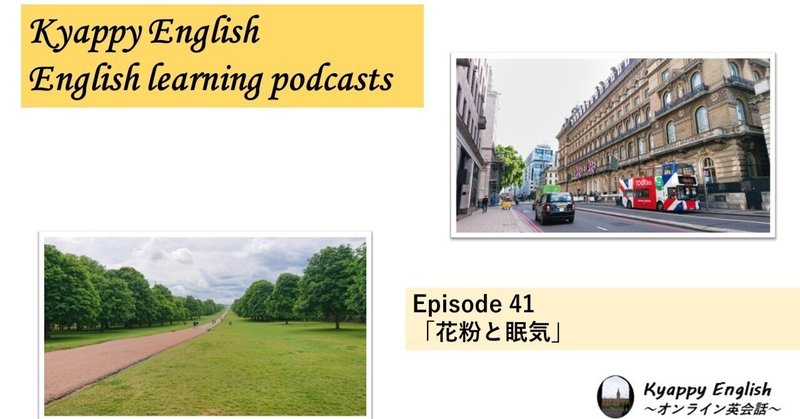
Episode 41 花粉と眠気
Introduction:
"Hello there, and welcome to my English learning podcast. Today's theme is ' Pollen and Drowsiness’. Now we are in the midst of hay fever season, we'll explore the symptoms and how they impact our daily lives.
Small Discussion Question 1:
Let's start with our first question: Will you tell me about your symptoms of your hay fever?
Sample Answer 1:
As the spring season approaches in Japan, it's a bit of a nightmare for me. The constant sneezing, runny nose, and itchy eyes make for a challenging season. Unfortunately, the struggle doesn't end there; insomnia becomes a major struggle.
Small Discussion Question 2:
How much does your hay fever affect your productivity?
Sample answer 2:
For me, it's a significant impact. When meeting clients outdoors, pollen seems to play tricks on me, resulting in unstoppable sneezing during important business meetings. On top of that, the lack of sleep and persistent drowsiness add to the challenge.
Now, let's start with the word 'pollen(花粉).' Pollen is a fine powder produced by plants, often carried by the wind or insects, and is a common cause of allergies off course. For example, “During spring, pollen from blooming flowers can trigger allergies in some people.”
Our next term is 'drowsiness(眠さ).' Drowsiness is the feeling of being sleepy or lethargic. For instance, “Some medications may cause drowsiness as a side effect, so it's important to avoid driving.”
Moving on, we have the term 'insomnia(不眠症).' Insomnia is a sleep disorder characterized by difficulty falling asleep or staying asleep. For example, “Stress and anxiety can contribute to insomnia, affecting both the quality and duration of sleep.”
Now, let's explore the expression 'play trick on(~に悪さをする).' This phrase means to deceive or prank someone in a playful manner. For instance, “On April Fools' Day, it's common to play tricks on friends, keeping the atmosphere light-hearted.” Remember, hay fever is not a person so the phrase was used in a figurative way.
Lastly, we have the phrase 'on top of that(加えて、さらに).' This expression is used to add information or emphasize an additional point. For example, “She has a demanding job, and on top of that, she's pursuing a master's degree in the evenings.”
Conclusion:
Let’s call it a day today. Don’t meddle with your nose and eyes too much. It would worsen your situation.
Until next time. Oh, runny nose again!
本日もご視聴ありがとうございました!
イギリス英語の発音練習動画も是非お求めください!
この記事が気に入ったらサポートをしてみませんか?
